Related Research Articles
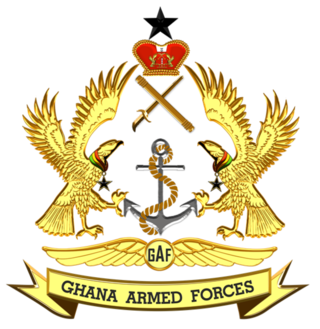
The Ghana Armed Forces (GAF) is the state military organisation of Ghana, consisting of the Army (GA), Navy (GN), and Ghana Air Force.
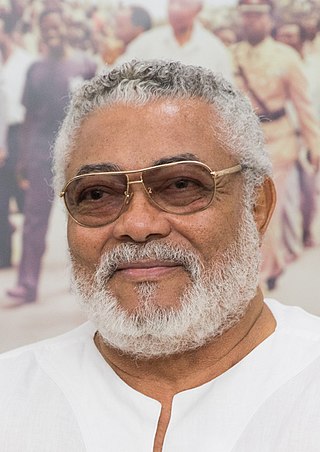
Jerry John Rawlings was a Ghanaian military officer, aviator and politician who led the country for a brief period in 1979, and then from 1981 to 2001. He led a military junta until 1993, and then served two terms as the democratically elected president of Ghana. He was the longest-serving leader in Ghana's history, presiding over the country for 19 years.
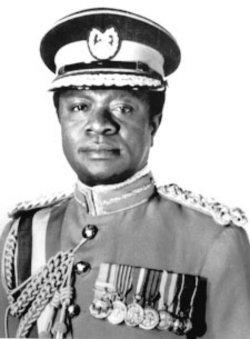
Ignatius Kutu Acheampong was a Ghanaian military officer and politician who was the military head of state of Ghana from 13 January 1972 to 5 July 1978, when he was deposed in a palace coup. He was executed by firing squad on 16 June 1979.
Lieutenant General Akwasi Amankwaa Afrifa was a Ghanaian soldier, farmer, traditional ruler and politician. He was the head of state of Ghana and leader of the military government in 1969 and then chairman of the Presidential Commission between 1969 and 1970. He continued as a farmer and political activist. He was elected a member of Parliament in 1979, but he was executed before he could take his seat. He was executed together with two other former heads of state, General Kutu Acheampong and General Fred Akuffo, and five other generals, in June 1979. He was also popularly referred to by his title Okatakyie Akwasi Amankwaa Afrifa and was in addition the abakomahene of Krobo in the Asante-Mampong Traditional Area of the Ashanti Region of Ghana.
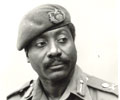
Lieutenant General Frederick William "Fred" Kwasi Akuffo was a Ghanaian soldier and politician who was the Chief of the Defence Staff of the Ghana Armed Forces from 1976 to 1978, and chairman of the ruling Supreme Military Council and the sixth military head of state from 1978 to 1979. He became leader of the government in a palace coup against General Ignatius Kutu Acheampong, and was overthrown and executed in another military coup less than a year later.
Faustina Acheampong was the First Lady of the Republic of Ghana from 1972 to 1978. She was the spouse of General Ignatius Kutu Acheampong, Chairman of the National Redemption Council and Supreme Military Council and Head of state of Ghana from 1972 to 1978.

The Supreme Military Council (SMC) was the ruling government of Ghana from 9 October 1975 to 4 June 1979. Its chairman was Colonel I.K. Acheampong. He was also the Head of state of Ghana due to his chairmanship.
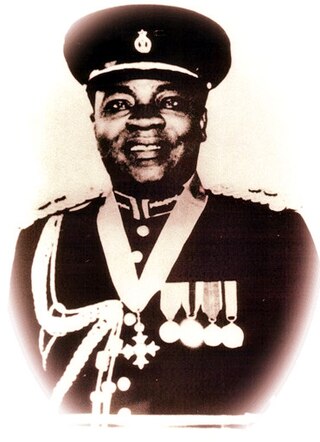
Erasmus Ransford Tawiah Madjitey, was a Ghanaian police officer, diplomat and politician. He was appointed Police Commissioner in the Dominion of Ghana on 9 October 1958, making him not only the first Ghanaian to head the Ghana Police Service, but also the first African south of the Sahara and in the British Commonwealth to command a police force.

A referendum on the system of government was held in Ghana on 30 March 1978.

From 1966 to 1979, the nation of Ghana underwent a turbulent era as the Second Republic of Ghana. It began when the government of Kwame Nkrumah was overthrown on February 24, 1966 by a military coup.
Major General Neville Alexander Odartey-Wellington (1934–1979) was a Ghanaian army officer who was Chief of Army Staff of the Ghana Army from 1978 to 1979. He died in action leading loyal troops against revolting forces during the 4 June 1979 military uprising in Ghana which toppled the Supreme Military Council II government led by Fred Akuffo.
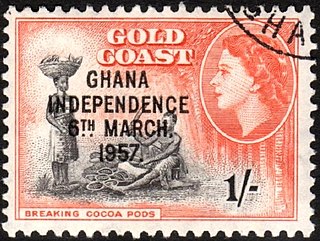
Ghana gained independence from the British on 6 March 1957. It is a member of the Commonwealth of Nations. The country became a republic on July 1, 1960.
1960s in Ghana details events of note that happened in Ghana in the years 1960 to 1969.
The June 4th Revolution or June 4th Uprising was an uprising in Ghana in 1979 that arose due to a conflict between the lower ranks and officers in the Ghana armed forces. This led to frustration among the general public and misunderstandings within the Ghanaian army.
The National Reconciliation Commission was established in January 2002 by the Parliament of Ghana. The goal of the commission was to establish an "accurate, complete and historical record of violations and abuses of human rights inflicted on persons by public institutions and holders of public office during periods of unconstitutional government." The Commission was formed after a new democratic party won the elections in 2000. The Commission covered human rights violations in Ghana from 1957 to 1993. It looked into government abuses and military coups staged by former president Jerry Rawlings. The members of the Commission worked until the end of 2004.
Benjamin Kofi Amoah Forjoe was a Ghanaian police officer, diplomat and politician.
Kojo Tsikata was a Ghanaian military officer and politician, who served as the Head of National Security and Foreign Affairs of the Provisional National Defence Council (PNDC). He was listed as a retired army captain in the Ghana Army.

The Political history of Ghana recounts the history of varying political systems that existed in Ghana during pre-colonial times, the colonial era and after independence. Pre-colonial Ghana was made up of several states and ethnic groups whose political system was categorized by 3 main administrative models; Centralized, Non-centralized and Theocratic states. In the colonial era, the British Empire employed different forms of government among its four territorial possessions in the Gold Coast. Indirect rule was implemented in the late 19th century after its success in Northern Nigeria. From the 1940s, native Ghanaians yearned for more autonomy. This resulted in the several constitutional reforms as well as the creation of the office of the Prime Minister in 1952.
Joseph Kwame Kingsley-Nyinah was a Ghanaian judge who served as a justice of the Court of Appeal and also as the Electoral Commissioner for Ghana.
References
- ↑ "The National Liberation Council and the Busia Years". www.ghanaweb.com. Archived from the original on 16 May 2011. Retrieved 21 May 2011.
- 1 2 "Kwame Nkrumah Profile:". www.ghanaweb.com. Archived from the original on 16 May 2011. Retrieved 21 May 2011.
- 1 2 3 4 "The National Redemption Council Years, 1972-79". www.ghanaweb.com. Archived from the original on 16 May 2011. Retrieved 21 May 2011.
- 1 2 3 4 5 6 7 8 "The Rawlings Era". www.ghanaweb.com. Archived from the original on 16 May 2011. Retrieved 21 May 2011.